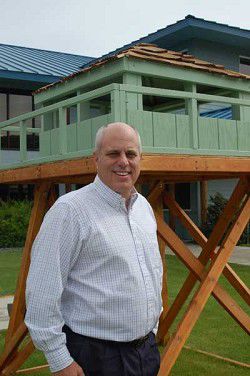New MNF boss arrives to host of knotty issues
Published 5:00 pm Tuesday, June 10, 2008

- <I>The Eagle/Scotta Callister</I><BR>Doug Gochnour stands outside forest headquarters, with its model of a fire lookout, in John Day.
JOHN DAY – Doug Gochnour probably couldn’t have picked a busier time to take the helm of the Malheur National Forest (MNF).
Opposing factions have just signed off on a pact to allow the Thorn and Egley post-fire salvage operations to go through. The forest is at the center of a grazing controversy, with an injunction granted by a federal judge on two MNF allotments. The annual fire camp is training rappel crews for the 2008 wildfire season, and the staff is gearing up for this weekend’s MNF 100th birthday celebration.
“My honeymoon lasted about 30 minutes,” Gochnour said last week. “And all of sudden I was in meetings, meeting people and answering questions.”
Gochnour, a 31-year veteran of the Forest Service, said that’s all right by him. He plans to continue meeting with lots of folks – staff, community and interest groups – as he gets acquainted with the forest and its issues.
Gochnour, who got to town a couple of weeks ago, succeeds Gary “Stan” Benes, who left the forest after two years as supervisor to move to Montana, and acting supervisor Cassius “Cash” Cash, who filled in for a couple of months this spring.
The new supervisor said he’ll be on hand this Saturday at the celebration of the forest’s 100th birthday, with family-oriented events from 10 a.m. to 4 p.m. at the Grant County Fairgrounds.
The festivities aside, Gochnour has some serious goals for the forest. He said he wants to continue the collaboration efforts in timber fostered by Benes; to work on grazing and range issues; and fill some vacant positions in the agency.
Gochnour came to the MNF from the Boise National Forest, where he was district ranger on the Idaho City Ranger District.
He’s been an acting supervisor in the past – once on the Clearwater National Forest and once on the Sawtooth, both in Idaho. He said that experience helped prepare him for this new challenge.
A rural posting is not new for him. Gochnour said he spent the last 17 years in small communities that bore similarities to Grant County in their economic reliance on natural resources, the independent citizenry and even a tendency toward a love-hate relationship with the federal government.
His last post, in Idaho City, was a district that had a strong timber program. But it also had a problem, he said.
“The infrastructure was all gone,” he said. The mills had gone boom and bust over the years in a gradual erosion of the local industry.
As a result, the timber harvested there was being shipped out of the area to mills elsewhere, even in Eastern Oregon.
With the rising cost of fuel, that kind of operation will only get more difficult, Gochnour said.
He said he realizes that on the MNF, the industry will be needed to accommodate important forest restoration work in the future.
“It’s really important that we maintain the infrastructure that we have here in Grant County,” he said.
Gochnour said the harvest in his Idaho district was facilitated by the fact that they had no anadromous fish issues, but there were concerns about other species – goshawks and woodpeckers, to name a few – that had to be addressed.
He said the Forest Service staff worked with conservationists, local governments and other groups to reach agreement on green timber projects and even some salvage operations.
He said he was thrilled to learn of the recent agreement between industry and environmental groups on the Thorn and Egley post-fire projects, describing it as “like a ray of sunshine.”
On the flip side, he’s concerned about challenges to the grazing program. The injunction granted May 16 on the two MNF allotments affects six ranchers who hold permits to run cattle there.
Gochnour said the forest staff is working with the ranchers to find alternate pasture that meets their needs.
However, he worries that the grazing controversy will get worse before it gets better. Some groups, he said, have individuals that oppose any grazing on public lands.
“I’m not among them,” he said. “I think grazing is a perfectly legitimate use of the national forest.”
He also noted that it’s important not just for the ranchers who depend on the forest allotments, but for the local economy.
A further concern is the amount of time that litigation takes from the staff. A biologist who is tied up on legal work won’t be free to do resource work, he said.
Overall, Gochnour said he hopes to help the agency seek out a level of stability for both timber and agricultural interests on the forest.
Meanwhile, he’s been meeting with politicians, ranchers, timber operators, conservationists, snowmobilers and, of course, the MNF employees.
“It seems like a great bunch of people,” he said.
Outside of work, Gochnour is looking forward to getting more involved with the community. He loves to golf, hunt and fish, and has considerable experience as a volunteer official for high school football and other sports.
He and his wife Ann, an elementary teacher, are looking for a home to settle into with their golden retriever. They have two grown children: Travis, who lives in New York City, and Whitney, who is a student at Boise State University.






